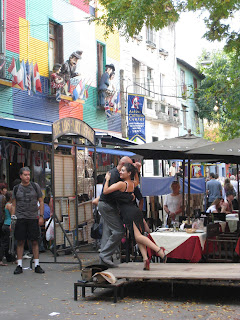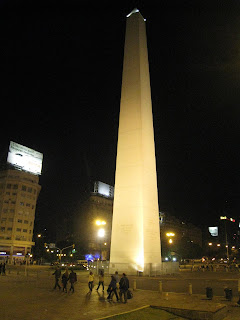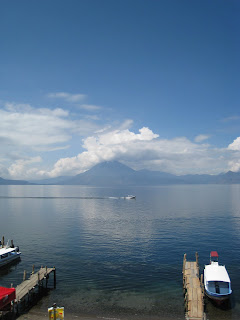
I took an early morning bus from Buenos Aires to Rosario (5h, 50 pesos, 10€) on Monday and was greeted by my host Juan at the bus terminal. After he finished giving virtual Spanish classes to his pupils all over the world we went for a walk to admire the beauty of the flag monument in Rosario, the place where the Argentinian flag rouse into the air for the first time. With a belly full of beautiful empanadas and tasty paella it was sweet to get to bed early.

On Tuesday I met Adriana, who happens to be friends not only with Juan but also my next host Martin, and we took a walk, had lunch and shared many thoughts together. Adri had read on my profile that I consider having a stroke at the age of 27 to be one of the most amazing things that has happened to me – the fact that her best friend died suddenly of a stroke at the age of 27 is definitely far from amazing. Our long talks on that and on some issues I had been battling with lately was great, something I really needed, when all my lovely friends I normally have these talks with are are so far away.


After searching for the best price for Dom Perignon in Buenos Aires (840-900 pesos, 165-175€) I forgot to buy it in the end, but luckily a shop in Rosario offered even a better deal: 880 pesos, but only 750 (145€) if you pay in cash. So I got my precious cheaper but without a receipt, which could cause problems in the Uruguayan border if I was very unlucky. My host, Juan, el viejo, turned 39 the next day so I got him a piece of cake and my Dom Perignon box, filled with something else than my precious though.

On Wednesday Martin picked me up from the Santa Fe bus station and welcomed me to their house known as Casa Babylon. He lives with two other guys, and from the looks of the flat you could never tell that its inhabitants are three males in their early twenties or thirties – everything is spotless and in perfect order (I wonder who'd like that...). And these guys are by no standards boring nerds who would spend their days only studying and polishing the house, but party animals with an active life style; going out every night, cooking yummy stuff every day and having friends coming over all the time.

We watched Nightwish concert videos, many episodes of Little Britain (wasn't even my idea, don't be giving me your evils!) and danced until 4am on Saturday morning, only 5 hours before my bus to Concepcion del Uruguay (6h, 48 pesos, 10€ ). I'll never forget the guys of Casa Babylon and their princess, the bitch Petra, and will be carrying a piece of them with me on this trip; The shoes I bought from the local shoe factory to replace my old sandals worn out from 6 weeks of walking are made from the same fabric as their table cloth!

The person waiting for me in Concepcion (del Uruguay) was a friend of my hosts, Adrian, the first CSer contacted in the city, who also me recommended staying with his friends José and Mariela at Mariela's dads house. After seeing the city centre we took a ride to the beach through the subourbs that were covered with a meter or two of water just this January, when the river flood, with our mate thermos, which is something Argentinians and Uruguayans would never leave behind, even though in my opinion this tea-like herbal infusion tastes like tobacco, not drinkable at all.

Then Adrian and his mother took me to a 1-year birthday party of a little girl in the neighbourhood and the mum reminded me of my mum asking me for example if I knew what digital cameras or pizza are – you never know what foreigners might find exotic, you know! The next day is was time for another, supposed-to-be-a-surprise-but-someone-spilled-the-beans, bday party when José's dad got 50 years older than the little girl yesterday.

In between chicken breast, potato salad and the caramel cake, José and I had a long talk on among other things the Finnish Botnia factory still causing demonstrations in Argentina. When he then asked me if I wanted come to his work at the local radio station later on the same day, I had no idea what I just said yes to. Only when the program was on air and he started by introducing the listeners to what today's show was going to consist of, I realised I was going to be on it! Luckily I didn't have to comment to the factory, since José just quoted some of my previous statements at the dinner table, when he was interviewing one of the demonstrators, but instead the two DJs surprised me by asking about my work, Adlibris and electronic books, 'cause the international book day is coming up next week. This was followed by some music by Jean Sibelius and Stratovarius; just an average night on Argentinian radio, I'm sure...!

I really liked hanging out with José and Mariela, having good conversations and many laughs with them and their friends, so leaving off towards Uruguay the next day was bitter sweet. I was almost holding me breaths in the customs to see if they'd take away my Dom Perignon, but both of us made it to Paysandú (1-3 hours, 15 pesos, 3€ ) and a few hours later to Tacuarembó (4h, 250 pesos, 5€) without a scratch.
 Streets and dogs
Streets and dogsThe streets of Argentina, like in Mexico and Guatemala too, are filled with runaway dogs. My initial reaction was to think this was a problem. But no, people like the dogs, some of them are protected by the city and nobody seems to mind them. Most of the dogs don't bother you in any way, but even the ones that bark and run after cars causing traffic hazards seem to be popular with the locals. My host in Santa Fe actually got his dog from the street; just took it home with him. Now this street bitch is the princess of the household. People's attitude towards these creatures, and perhaps to animals in general, is probably more natural than that of those of us who only see leashed dogs who never run around to smell strangers, unless they are behaving badly of course. Dogs can be even a part of the family dinner, when the guests of a birthday party take turns in throwing chicken bones to the dogs wondering under and around the table.
However, one of the possible difficulties of being able to take a dog home from the streets without paying for it might be that you don't really have to think hard before taking a pet. You can just take it, but abandon it when it suits you, and obviously dogs have their feelings and needs too
 Streets and men
Streets and menThe number one thing that has annoyed me in Argentina has been machismo, which is portrayed most clearly in the way men make piropos, flirtations comments, to women on the streets. First I thought it was natural for me to get offended when total strangers feel they have to right to harass me by making comments on my appearance and pathetic that this not only the act of the old and the ugly, but something that even the young and hansom have the habit of doing. What bugged me even more was that the local women, even though they said they don't encourage it, don't react to it negatively either, this way giving their signal of acceptance. Then someone ask me what my problem with people giving complements to each other and I replied this wasn't the case of people complementing each other but men commenting and judging womens' appearance. The reply was that it's not judgement 'cause piropos are aimed at all women regardless of their shape, size or any other feature. And being insincere is supposed to make it better, ey?!

But was is my problem in men giving complements to women really? I don't mind if a friend gives me a complement. Why do I get offended when a stranger does it? Why are we taught even since we are little not to talk to strangers or comment on anything about them aloud, not even anything positive? And the only excuse to break this rule is being drunk, when the drunkards comments are either completely ignored as drunken talk or taken as complements; things that they didn't have to courage to say when sober.
 Weather can do that to a nation?
Weather can do that to a nation?When Julio, an incredibly talkative and passionate Argentinian, a friend of my host Martin first said to me that he believes the weather has influenced the way Nordic and Latin societies have development to where they are today and that our welfare state is only a result of the arctic circumstances we live in the Nordics, I laughed. When he continued to explain how in hot climates people haven't had to plan as much since they could survive by sleeping on the beach and grabbing a fruit from the trees for food, while as in the North not planning ahead for the winter would've resulted in death and survival without co-operation with other members of the society would've been difficult, I still wasn't convinced to the least. But after leaving Julio and Santa Fe behind I continued analysing the differences between the North and the South also with José who pointed out that the most organised country in Latin America, Chile, happens to also be the one with the toughest climate in the area, and I little by little started seeing where Julio was coming from. Maybe. Who knows. Everything is part of it, and past has without a doubt an influence on how we think in the present. Research and endless interviews with to local population continue.
Well, I'm not sure if the climate has allready started affecting my compulsive plannin disorder (actually something has), but I've definately started getting used to the warm.

Yesterday I found myself wearing long sleeves in the temperature of 27 degrees Celsius and 23 felt just plain chilly. So I don't look forward to November in Stockholm but have started dreaming of the soon approaching June in Brazil.
“Tree huggers – be aware!” ->
 Two nervous people met at the Tacuarembó bus station (in Northern Uruguay) on Monday evening; one experienced surfer who had accepted a couch from a serial-killer looking guy without any previous references and another, CS beginner who didn't know what to expect from his first hosting experience. When I left Gonzalo's place on Thursday morning we were both happy it worked out so well: He didn't kill me and I didn't steal his shit. And we both made a new CS friend and will meet again this Sunday in Montevideo.
Two nervous people met at the Tacuarembó bus station (in Northern Uruguay) on Monday evening; one experienced surfer who had accepted a couch from a serial-killer looking guy without any previous references and another, CS beginner who didn't know what to expect from his first hosting experience. When I left Gonzalo's place on Thursday morning we were both happy it worked out so well: He didn't kill me and I didn't steal his shit. And we both made a new CS friend and will meet again this Sunday in Montevideo. Tacuarembó was refreshingly small and quiet town after all these cities I've found myself in lately. If you're ever been to Stureplan in central Stockholm you know the mushroom monument there (the pole you held on to after having too many drinks at the Spybar = Swedish for throw-up bar). Well, Tacuorembó has got one too, and it might not be surrounded with crowds of people with perfect bone structures and outfits that cost more than your monthly rent, but an outdoor pool, a few palm trees and blooming cactus make up for that nicely. MAISEMA Having free wifi in all public parks is a bonus too, especially for a poor traveller who hadn't remembered to call her mum in Skype for more than 7 weeks.
Tacuarembó was refreshingly small and quiet town after all these cities I've found myself in lately. If you're ever been to Stureplan in central Stockholm you know the mushroom monument there (the pole you held on to after having too many drinks at the Spybar = Swedish for throw-up bar). Well, Tacuorembó has got one too, and it might not be surrounded with crowds of people with perfect bone structures and outfits that cost more than your monthly rent, but an outdoor pool, a few palm trees and blooming cactus make up for that nicely. MAISEMA Having free wifi in all public parks is a bonus too, especially for a poor traveller who hadn't remembered to call her mum in Skype for more than 7 weeks.  Montevideo (bus 5h, 390 pesos, 14€ from Tacuarembó) welcomed me with a free map from the tourist office at main bus terminal and the adoption to two non-spanish speaking Aussies who I guided to my hostel for the weekend. The Che Lagarte Hostel took my backpack for safekeeping for the night for free and promised I was not only allowed to drink alcohol at the hostel when I checked in the day after, but they'd also provide ice and a bucket for my champagne.
Montevideo (bus 5h, 390 pesos, 14€ from Tacuarembó) welcomed me with a free map from the tourist office at main bus terminal and the adoption to two non-spanish speaking Aussies who I guided to my hostel for the weekend. The Che Lagarte Hostel took my backpack for safekeeping for the night for free and promised I was not only allowed to drink alcohol at the hostel when I checked in the day after, but they'd also provide ice and a bucket for my champagne.  Relieved to have it all ready for my celebration I had lunch at the Basque Euskal Herria restaurant, enjoying eating vegetables and salads after consuming probably a whole cow, intestines and organs included, with Gonzalo and his friend the night before. Maybe I'll pop by for txupito of Basque magic potion pacharán tomorrow – for good old times... Then again, after a year of alcohol abstinence, a bottle of Champagne might be plenty for one day.
Relieved to have it all ready for my celebration I had lunch at the Basque Euskal Herria restaurant, enjoying eating vegetables and salads after consuming probably a whole cow, intestines and organs included, with Gonzalo and his friend the night before. Maybe I'll pop by for txupito of Basque magic potion pacharán tomorrow – for good old times... Then again, after a year of alcohol abstinence, a bottle of Champagne might be plenty for one day.

















































